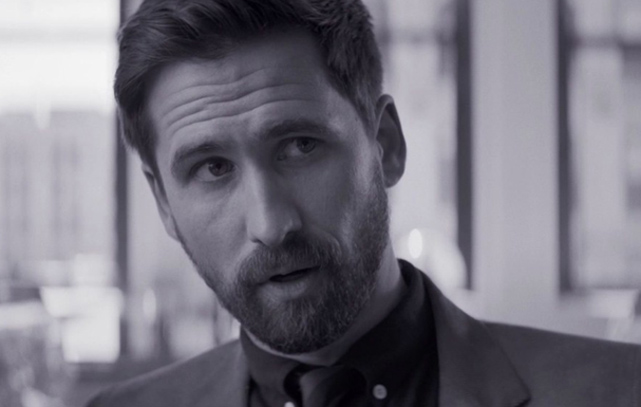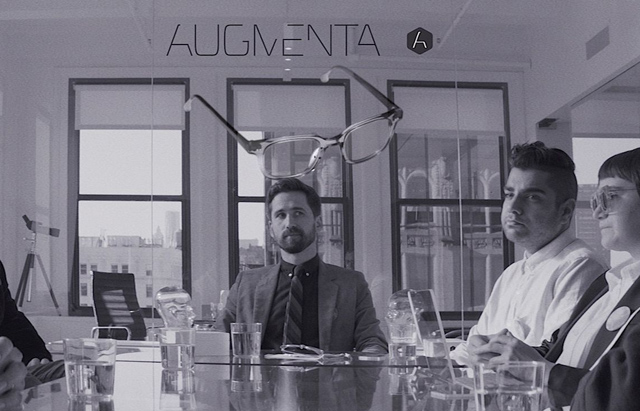CHICAGO – Patrick McDonald of HollywoodChicago.com appears on “The Morning Mess” with Dan Baker on WBGR-FM (Monroe, Wisconsin) on March 21st, 2024, reviewing the new streaming series “Manhunt” – based on the bestseller by James L. Swanson – currently streaming on Apple TV+.
Interview: Director Benjamin Dickinson Maintains ‘Creative Control’
CHICAGO – There is a tremendous excitement when a fresh director voice is realized, and writer/director/actor Benjamin Dickinson is one such discovery. His feature film debut is ‘Creative Control’ – which like previous futuristic films ‘Ex Machina’ and ‘Her’– explores sex and relationships through our technological evolution.
The film is set in the near future, in Brooklyn, and involves an advertising agency on the cusp of landing their biggest account, a company whose application creates Augmented Reality (AR). David (Benjamin Dickinson is lead actor as well) is the account facilitator, and begins to use the technology for strange purposes, as in building a hyper-realized version of his best friend’s girlfriend, Sophie (Alexia Rasmussen). This begins a rift with his own live-in girlfriend, Juliette (Nora Zehetner), and a change in relationship with his best friend Wim (Dan Gill), not to mention a downward spiral regarding the important client.

Director Benjamin Dickinson Portrays David in ‘Creative Control’
Photo credit: Magnolia Pictures
Benjamin Dickinson talked to HollywoodChicago.com via phone, as he introduced the savory and thought-provoking film last weekend at the Music Box Theatre in Chicago, where it plays through March 24th, 2016, and is in limited release elsewhere.
HollywoodChicago.com: By doing this film in Black&White, except for a key scene, what do you think you were able to accomplish with this story that color simply would have accomplished?
Benjamin Dickinson: When doing a film set in the future for a half million dollars, there was a less of a worry using black & white in regard to the look of locations, set design and other production factors. The costume and set designers worked together with the cinematographer to create the environment, to slightly remove it from present day. The other thing I couldn’t achieve with color was the graphic design and banal world of technology.
HollywoodChicago.com: When did it become apparent that you would portray David. Is it what you intended all along or did it become clear at some point in the writing or pre-pro process?
Dickinson: It became clear when all the actors I asked to portray David said ‘no,’ and the start date was rapidly approaching. I did audition a bunch of theater actors, and obviously I wanted a great actor to do this key role. When it came down to the realization that we didn’t need a ‘name,’ I just decided I could save a little money on catering if I cast myself. [laughs]
HollywoodChicago.com: We’ve had ‘Her,’ ‘Ex Machina’ and now your film. In the history of sex and media, do you believe that when augmented technology in your movie becomes available, will it be the downfall of relationships?
Dickinson: Being in a relationship is pretty difficult, and seems to have been so for thousands of years, so it’s kind of up to us. What is important has to become clearer, and now there is a bit of a ‘pleasure principle’ in action. Our current trajectory is hedonistic, and the augmentation shown in the film can replace relationships for a lot of people. There will become a situation of conscious choice that people will face, it will depend on what they want.
HollywoodChicago.com: It’s obvious that David is a very selfish and self-absorbed individual, who doesn’t really reach out to others until his back is against the wall. Do you think that is the overriding characteristic of a successful creative form, whether in the ad game or the movie business?
Dickinson: David has a mercenary personality, and that is endemic to capitalism in general. In capitalism you have to win, and we decide who is a good person based on who makes the most money. It’s part of our economic system.
The goal of a publicly owned corporation is to make more profit every year, or are considered a losing business, and the board of director’s goal is to make more money for their shareholders. But there doesn’t seem to be any discussion about ethics or responsibility to the community. That becomes problematic, because we’re mammals that have to live on this planet, and we have all kinds of needs that has nothing to with money. Money only represents wealth, but real wealth is health, right? But it’s a comedy, so I’m making fun of everyone.
HollywoodChicago.com: You helped to create David, and then you processed him through performance. What part of you knew him best?
Dickinson: My lizard brain understood David best – that animal fear – the violence in me and the anger in me. That was the part of myself that I was tapping into and trying to examine. We’re so socialized, that all of our basic needs get filtered through the phoniness of our facades. That is the essence of David’s hypocrisy. It was nice to embody someone that disconnected because it felt like an exorcism for me.
HollywoodChicago.com: Your casting was utterly perfect. How much auditioning had to take place to find Nora Zehetner – who had to be an actress/yoga guru; Alexia Rasmussen – who needed to be representative as both Sophie and a hyper-realized version of Sophie; and Dan Gill – who was so brittle adn divisive as a two-faced best friend?
Dickinson: It was a difficult process, because as you said they had to be a lot of things. I saw a lot of great actresses who could play Sophie, but not the AR version of Sophie. Alexia had an alien-quality to her beauty, that could be rendered in digital form. Nora was offered to me only, and she didn’t audition, but she could do the high level yoga necessary for the role. She also grasped the humor of it all, but didn’t have to sell it.
Dan Gill is a stand up comic, and originally auditioned for David. He was a bit too relaxed for that character, but he was amazing as Wim. In real life, Dan is the nicest guy, he is nothing like the character. He’s from Iowa. [laughs]

Benjamin Dickinson as David Oversees an Advertising Meeting in ‘Creative Control’
Photo credit: Magnolia Pictures
HollywoodChicago.com: Your advertising scenarios were perfectly realized as well, down to the Ad Rep for the client that needs to justify her job, to the chain of command playing telephone, to the final cut of the ad that is being produced. When did you have the most exposure to this world, and were you afraid that some of your ad friends would recognize themselves?
Dickinson: They’re probably so vain their reaction would be, ‘well, I know somebody like that.’ [laughs] I haven’t worked on the agency side, but I have directed commercials. I’ve seen the crazy behavior. But what is amazing about advertising, since it’s just trying to sell a product, is that it doesn’t have any integrity. For example, they’ll say ‘Why don’t we get that director that makes fun of advertising?’ As long as it worked and was popular, they don’t care.
HollywoodChicago.com: There were nods to the novel ‘Brave New World,’ the films of Stanley Kubrick, and even shades of Michelangelo Antonioni’s ‘Blow Up.’ What do you think the essence of literary and cinema culture has taught you about the wider perspective of your own artistic interpretations?
Dickinson: Film is literature, and I don’t hear much talk of that anymore, because of the economics of stars and entertainment. But there was a period of time when people would actually go to a new Ingmar Bergman, Federico Fellini or Michelangelo Antonioni movie, and those are the films I fell in love with, once I got really into movies. It is today’s static A-to-B plotting versus the type of output by Fellini or Bergman, where the crisis is spiritual or emotion. Their characters are doing more than representing the plot, they are actually embodying the persona – Antonioni, for example, does his long takes so we can be with that person for a period of time.
I found those film masters through Woody Allen. He re-did them all, except with jokes. When I saw ‘Annie Hall’ for the first time, I didn’t realize you could do that in a film, make something about your problems. There were so many naturalistic one-take shots, and it wasn’t until I got to film school and started watching the directors I brought up earlier, that I understood where it came from for Woody’s films. So I’ve stolen from Woody Allen, and the people he was stealing from…the theft goes on. [laughs]
HollywoodChicago.com: This film is set in a not-too-distant future. In working with the production design of this future, what concepts were discarded because you thought they might be too precious or fantastical?
Dickinson: There wasn’t anything huge. It was more about cutting some scenes that were riffs on Brooklyn culture. They didn’t play that well, even though they delighted me. [laughs] We did obsess about the clear phones and screens that were the electronic devices, and who was wearing Augmented Reality glasses, but in the end it didn’t matter that much, even though it became a bit of a rabbit hole.
HollywoodChicago.com: The filmmaker’s education is an immersive one, you’re staying with one concept in various stages for four years or more. So in the spirit of that immersive experience, what do you think you learned from ‘Creative Control’?
Dickinson: For me, making a movie is about a question or problem I’m struggling with, and the way I work through and answer the question is by making the film. Ironically, ‘Creative Control’ – which is a satire, and an angry film about someone stuck working in advertising – is maybe the thing that allows me to escape from myself. To quote Albert Camus, ‘If you can profit from your pain, all the better.’ People forget that some existentialists had great senses of humor.
As isolated and self-centered as David is, I think in the process of making the movie, and performing the part, that I have become less that way. I’ve become more connected to my friends, and become more open minded. That was a benefit of the exorcism.
 | By PATRICK McDONALD |


